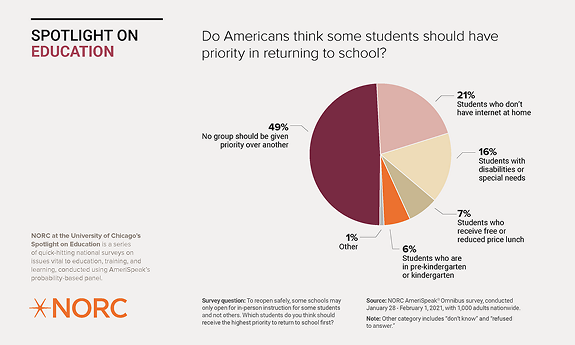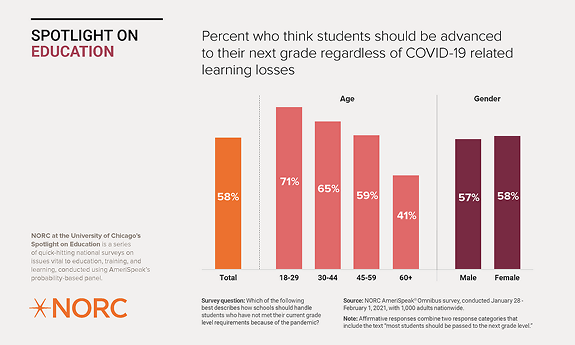Should Some Students Have Priority in Returning to School? 49 Percent of Americans Say No
Students who struggled with internet connectivity during the pandemic should not have priority in returning to school, say over half of American adults.
CHICAGO, March 2, 2021 – During the COVID-19 pandemic, students’ need for reliable internet access has become critical with so many of them engaged in distance learning. About 1 in 5 people (21 percent) in the United States believe students who do not have access to the internet should take priority for returning to the classroom first as in-person school resumes—but half of all people (49 percent) say no student should be prioritized over any other.
The findings come from the latest NORC Spotlight on Education survey powered by AmeriSpeak®. The survey results show 16 percent of Americans say students with disabilities should receive priority to return, and 7 percent say students who receive free and reduced price lunch should have priority.
“While the pandemic has created challenges for all children, expert opinion suggests that the youngest children and children with disabilities should be prioritized when returning to in-person learning,” said Jennifer Hamilton, vice president at NORC at the University of Chicago. “From this poll, it’s clear most people want all children to return to in-person schooling as soon as they can do so safely, but people seem to have missed that the pandemic has not treated all students equally, and the consequences of not being in school for those students is particularly dire."

Younger Adults Think Students Should Not Be Held Back for COVID-19 Related Learning Losses

Opinions by Age Group
Opinions varied by age group. Americans over the age of 60 were 53 percent more likely to believe that no particular group of students should be given priority over another group of students than Americans between the ages of 18-29.
58 Percent of Americans Think Students Should Not Be Held Back because of the Pandemic
Most Americans thought students should move on to the next grade level, even if they experienced some learning losses because of the pandemic. Younger adults were more likely to believe students should advance to the next grade compared to older adults (71 percent compared to 41 percent). However, there was no difference in opinion between genders. Around the same percentage of men and women believed that students should be either moved on to the next grade or held back.
Methodology
The self-funded poll was conducted between January 28 and February 1, 2021, during a monthly Omnibus survey. It included 1,000 interviews with a nationally representative sample (margin of error +/- 3.91 percent) of adult Americans age 18+ using the AmeriSpeak® Panel. AmeriSpeak is NORC’s probability-based panel designed to be representative of the U.S. household population. A comprehensive listing of all study questions, tabulations of top-level results for each question.
About the AmeriSpeak Spotlight on Education
NORC at the University of Chicago’s AmeriSpeak® Spotlight on Education is a series of quick-hitting national surveys on issues vital to education and its place in society, conducted using AmeriSpeak’s probability-based panel.
About NORC at the University of Chicago
NORC at the University of Chicago conducts research and analysis that decision-makers trust. As a nonpartisan research organization and a pioneer in measuring and understanding the world, we have studied almost every aspect of the human experience and every major news event for more than eight decades. Today, we partner with government, corporate, and nonprofit clients around the world to provide the objectivity and expertise necessary to inform the critical decisions facing society.
Contact: For more information, please contact Eric Young at NORC at young-eric@norc.org or (703) 217-6814 (cell).




